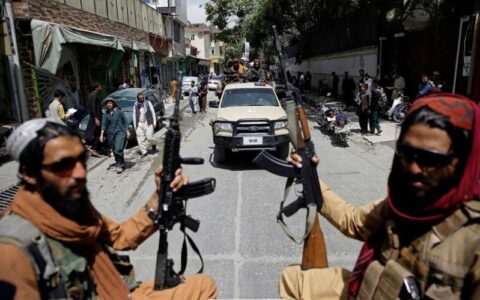
Terrorist leader Khalil Haqqani with $5m bounty back on centre stage in Afghanistan
The US wanted poster for Khalil Haqqani offers a $5 million reward for the capture of the Specially Designated Global Terrorist accused of links to Al-Qaeda.
But when Haqqani appeared publicly at Friday prayers in Kabul this week, clutching a US-made M-4 rifle, it was to assume a role overseeing security in the Afghan capital following the Taliban takeover.
That a prominent figure of the new Taliban regime is on both US and United Nations terrorist lists, highlights a newly permissive environment for terrorist groups in Afghanistan, counter-terrorism experts said, and undercuts Taliban assurances that the country will not become a haven for global terrorists again.
The Haqqani network has operated for decades in the tribal areas on the border of Afghanistan and Pakistan, maintaining close links to Al-Qaeda and the Taliban. Khalil Haqqani is the uncle of Taliban deputy leader Sirajuddin Haqqani.
The family network is a designated terrorist organisation accused of terrorist attacks and running an international fundraising network that specialises in kidnapping and ransoming of foreigners. The Haqqanis are believed to have helped Osama bin Laden escape from Tora Bora in 2001 as US special forces hunted the Al-Qaeda leader responsible for 9/11.
But while jiahdist groups from northwest Syria to Yemen hailed the Taliban victory this week – crowing that if the path of jihad could defeat a superpower in Afghanistan it could win elsewhere too – one group not celebrating was the Islamic State group.
While IS will be hoping to benefit from the Taliban’s takeover of Afghanistan, they will have to fight them first.
When the Taliban captured a prisoner at Bagram airbase last week, few were surprised when senior Al-Qaeda operatives were among thousands of prisoners freed. But when Taliban fighters opened a prison in Kabul days later there was one prisoner they did not release: Abu Omar Khorasani, the former head of Islamic State Khorasan, who they reportedly executed on the spot.
Sworn enemies, IS views the Taliban as a nationalist apostate group. In an editorial in one of its publications this week alleged a grand conspiracy in which the Afghan militants were in fact the puppets of the US crusader forces. It did not make much sense but it showed how IS hoped to use propaganda to discredit its enemy.
Islamist State Khorasan province is a local offshoot of the global terror franchise which gained a foothold in Afghanistan in 2015 and seeks to establish a Caliphate in South and Central Asia.
While the group has not carried out attacks in the west, it was responsible for nearly 100 attacks against civilians in Afghanistan and Pakistan, and about 250 clashes with US, Afghan and Pakistani Security Forces since 2017, according to the Center for Strategic and International Studies.
Attacks by the Taliban, Afghan and US forces largely drove IS-K from eastern Afghanistan in 2019, but the group will be looking to expand in Afghanistan once again as the former insurgents begin the difficult task of running a country.
“I think the Taliban is going to be forced into compromises in the pursuit of legitimacy that are going to disillusion some of its more hardline members,” said Laith Alkhouri, an intelligence adviser who analyses global terrorist groups, predicting a potential source of recruits from IS-K.
And if IS-K can grow their presence in Afghanistan, they could start plotting attacks abroad, according to a former head of MI5.
“If they get the opportunity to put down infrastructure and train then that will pose a threat to the west more widely,” Jonathan Evans told BBC Radio 4’s Today programme.
That possibility is worrying the United States, which is looking for reliable counter-terrorism partners in Afghanistan after its troops are withdrawn.
“One of the contingencies we are very focused on, laser-focused on, is the potential for a terrorist attack by a group like Isis-K,” White House national security adviser Jake Sullivan told NBC on Thursday.
But serious counter-terrorism experts suggest it is premature to worry about whether Afghanistan could be used to plot another large scale attack like the one that brought down the twin towers in 2001.
“Everyone is very animated in the west about the idea of another 9/11 – if that’s coming it’s way down the line,” said Raffaello Pantucci, a senior associate fellow at the Royal United Services Institute.
Source: MSN





